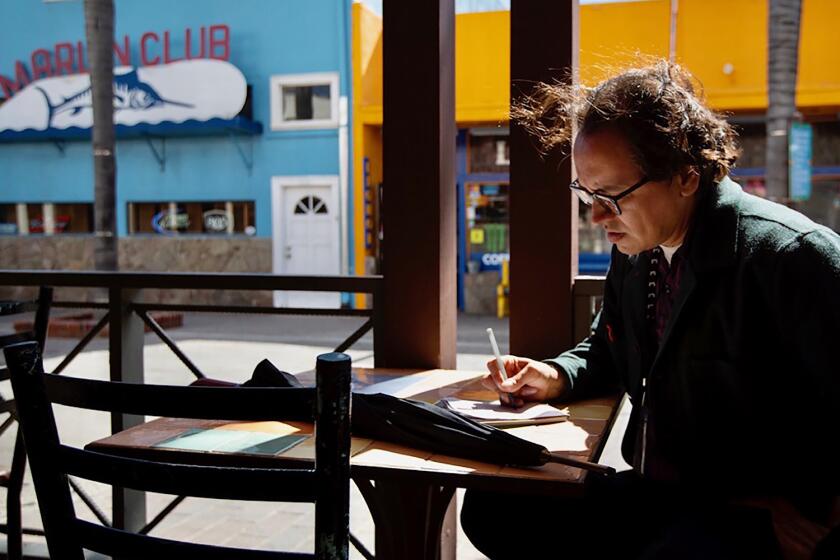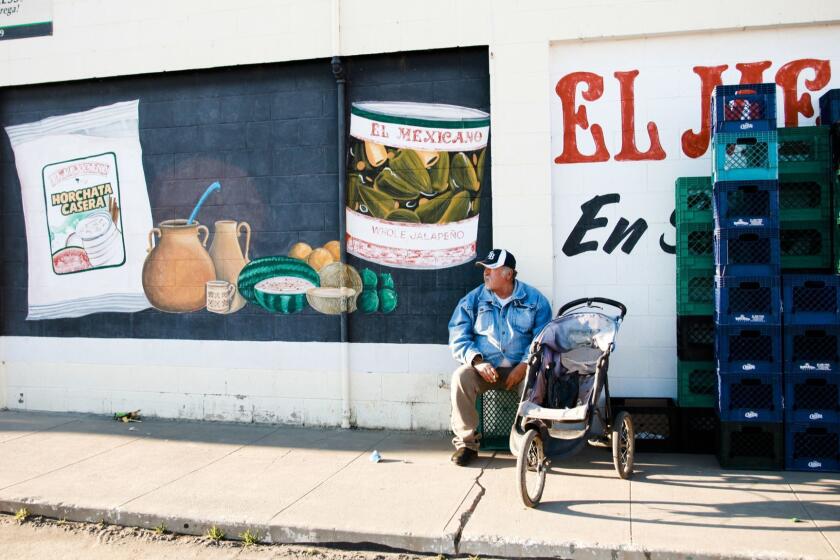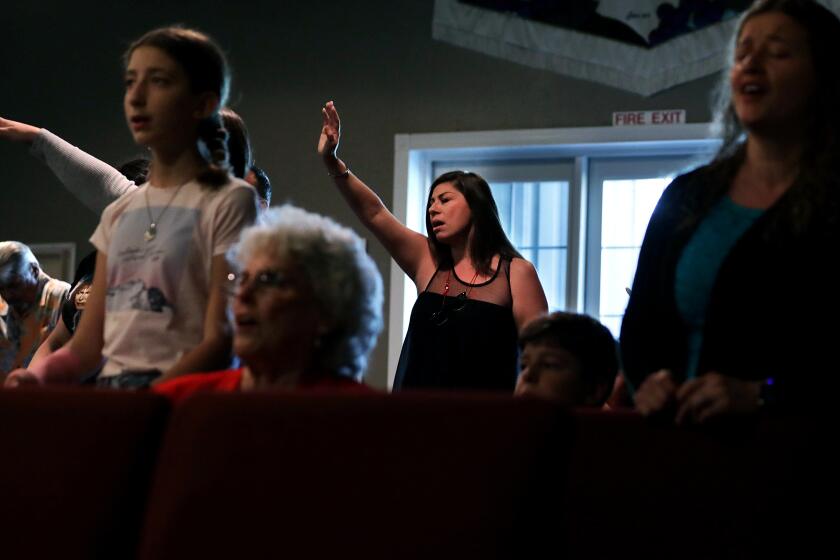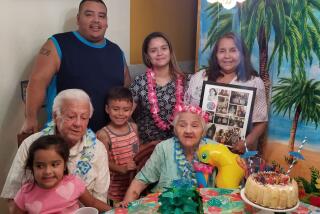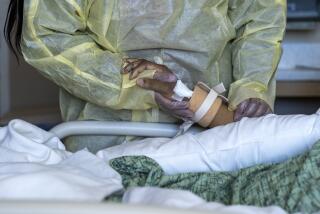One family’s COVID-19 nightmare shows the pandemic’s unjust burden on Latinos in California
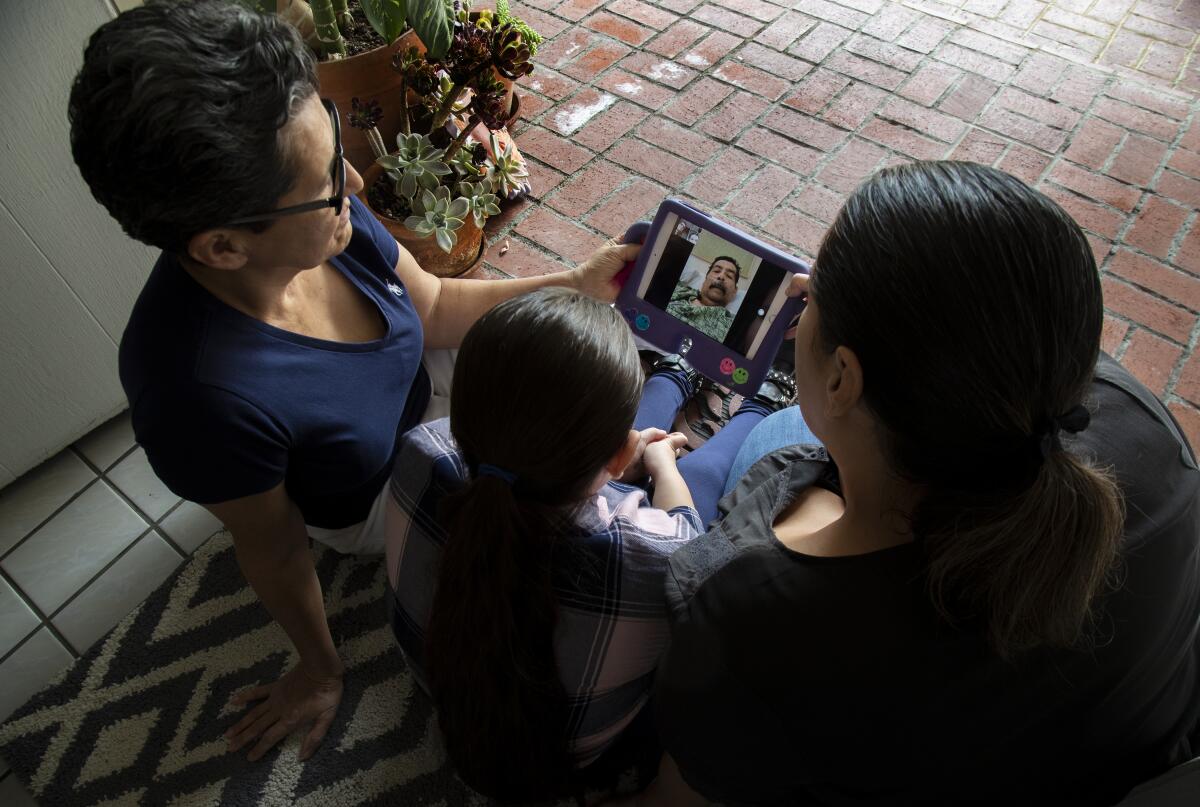
- Share via
Standing among barren shelves, empty bins and massive beer posters at Pancho’s Mini Market in a barrio near USC, Teresa Gonzalez had a simple message for anyone who still thinks the coronavirus is a joke.
“Cuídense,” the 63-year-old said, repeating it thrice. Take care of yourselves.
“It’s a sad reality,” she continued in Spanish, as her daughter Mabel and granddaughter Camila nodded in wearied, masked agreement. “Look around us. It destroyed our dream.”
Teresa and her husband, Francisco — universally known as Pancho — ran this mercadito for nearly 30 years. She was in charge of inventory; he ran the register from 8 in the morning until 9 at night. There were only five days since he acquired the store in 1991 that Pancho hadn’t shown up to work: Mabel’s high school and college graduations, her quinceañera and wedding and the kindergarten graduation of Camila a few years back.
But it was a blessed life.
Their long hours working for thin margins allowed the Mexican immigrants to move from a house down the street from the family business to a nicer one in Montebello. Pancho reveled in his role as a surrogate father to many of the teenage boys who popped in for soda and Takis and gladly helped older residents with answers to everything from how to pay utility bills to whom to call for immigration problems.
The nicknames customers had for him — Don Pancho, Panchito, even just Pancho’s Market — were all testaments of respect.
“We’d always joke to the people around here, ‘Pancho is more yours than ours,’” Teresa said.
Then the coronavirus came.
Gustavo Arellano is the Los Angeles Times’ newest California columnist.
Sales began to plummet in February as customers lost their jobs. Pancho began to open mid-morning and even as late as noon for the first time ever. He tried to make everyone feel at ease by mandating masks early on and took care to decontaminate himself every night before enjoying family time for a couple of hours.
But in mid-July, COVID-19 hit all four of the Gonzalezes.
Teresa, Mabel and Camila quickly recovered.
But Pancho — who didn’t show any symptoms, until he seemingly had them all at once — spent more than a month in the hospital. A barrel-chested, regal man, the 63-year-old was left so weak that a task as simple as sipping soup with a plastic spoon leaves him exhausted.
Now in a nursing facility, he can muster a couple of minutes of FaceTime a day with his family, and not every day. Lung scarring makes it hard to take full breaths. Months of physical therapy loom ahead.
So in early August, Teresa closed Pancho’s for good, at his request.
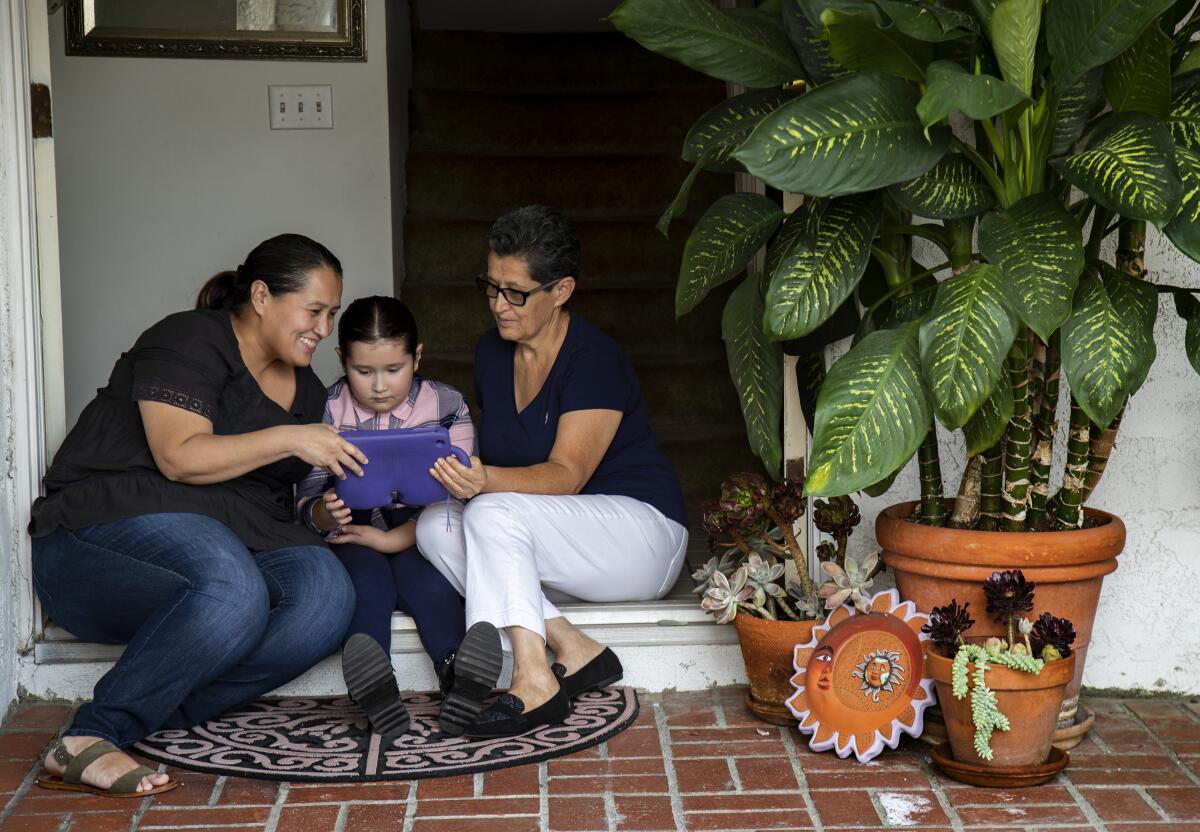
She cleared out most of the inventory as the month progressed, tossing the food that went bad and donating nearly everything else to people in need. When she returned to show me the mercadito, all that remained in the coolers were a couple of cold cases of Modelo and a lonely can of Mickey’s malt liquor.
“I’m happy he accepted [the closure],” Teresa said. “Because his life is the store.”
Her family has every right to be angry, hurt, sad.
All of us should feel the same.
What makes so many Latinos “essential” cogs in the ecosystem of jobs that help feed and serve America has put a big, fat crosshair for the coronavirus on our backs.
We’re hurting — again.
All of the public crises that threaten the California dream of housing, health, education and income are hitting us harder than other ethnic groups. Coronavirus is the latest reckoning for Latinos in California — and yet again, we’re playing defense against an offensive scheme hell-bent on breaking us.
Five years ago this month, the demographic face of California changed for the first time in its modern history.
Pancho and Teresa were part of a food industry — from the fields to slaughterhouses to processing plants to restaurants and stores — in which Latinos are overrepresented. These places have become petri dishes for the coronavirus. And yet the tragedy of this slow-moving disaster — which will have wide-ranging repercussions on healthcare, education and social mobility for years to come — has yet to provoke large-scale expressions of anger, despite being a public scandal like few others.
Mabel is a teacher for Los Angeles Unified School District and now lectures from the family’s dining room because district officials don’t have a definite plan on how to safely reopen schools.
Nearby, in the living room, Camila, 8, is one of millions of schoolchildren who must learn by squinting at a computer screen because our federal government couldn’t contain the coronavirus when it had a chance. Will this be a lost year for children like her?
By merely living their lives and carrying out their labor — often in demand, rarely appreciated — the Gonzalezes, like many Latinos, seemed fated to cross paths with the coronavirus.
Data from the California Department of Public Health show that Latinos make up about 39% of the state’s population but 60% of COVID-19 cases and 48% of deaths — far outpacing any other ethnic group in morbidity.
In Orange County, the majority Latino cities of Anaheim and Santa Ana — my hometown and where my wife runs her own small market — account for nearly 40 percent of all cases. Friends on Facebook have revealed how they or someone they know had contracted COVID-19 and implore everyone to take la corona seriously.
Experts blame a tragic trinity of causes: a preponderance of jobs that put Latinos in contact with strangers daily, a tradition of multi-generational households and high poverty rates.
If you’re Latino in California — even if, like me, you have the luxury of a white-collar job that grants you the privilege of working from home — it’s almost a certainty that COVID-19 will stalk the life of someone you love. Maybe your mom. Maybe dad. An uncle, an aunt. A sibling bestowed the bittersweet title of “essential” worker.
So I take it personally when protesters in Huntington Beach howl that mask mandates are tyranny, or when churches gather large flocks in defiance of stay-at-home ordinances — forgetting Matthew 18:20, which lays out a humbler blueprint for what makes a house of God: “For where two or three are gathered together in my name, there am I in the midst of them.”
Churches in California’s “Bible Belt” reopen, again, with new complications.
COVID-19 skeptics practice that oldest of California sports: disregarding the lives of Latinos by treating the crucibles Latinos must endure, more heavily than most, as abstractions, and their losses, in both deaths and economic progress, as a numeric inconvenience.
And yet …
Every weekend, I hear the strains of banda or mariachi, or the wallop of a wooden stick on a piñata, as yet another family holds a fiesta down the street from my house. A drive past a park reveals soccer games with unmasked players or taco trucks where customers line up with little thought toward social distancing.
I take that personally, too.
Latinos can’t blame white supremacy for the disproportionate impact of the coronavirus without also calling out ourselves. We should know better — yet we often don’t. No excuses.
Couple that with a traditional skepticism toward government diktats worthy of a Trump caravan, and that’s why Teresa wants to especially remind Latinos: Cuídense.
“I’ve heard our own gente say that it’s just a gripita [a little flu],” she said, shaking her head. “It’s not a game. You can be the assassins of your parents or children if you’re not careful.”
“Disbelief is going to stop when it hits your family,” added Mabel. “That’s when we finally get responsible.”
She said it with a tone much like her mother’s: not accusatory, but with a serenity that was almost preternatural.
What keeps the two from despair is their Catholic faith. The Gonzalezes are parishioners at St. Benedict Church in Montebello. Near the entrance to Pancho’s Mini Market, Teresa has kept up faded images of the Archangel Michael and San Martin Caballero, staples of Latino small businesses.
“When I came back to start emptying the store,” she said, “I told God, ‘You gave it to me, and I received it with much joy. Today, I return it to you with the same joy that I received it the day that you let me borrow it.’”
The Gonzalez women are trying to focus on the positive in the face of an uncertain future. Teresa said the friends and family who brought food to their doorstep while she, Mabel, and Camila were quarantined “were such a marvel of love.” Camila looks forward to the day that Ato — her nickname for Pancho — returns home from the nursing facility.
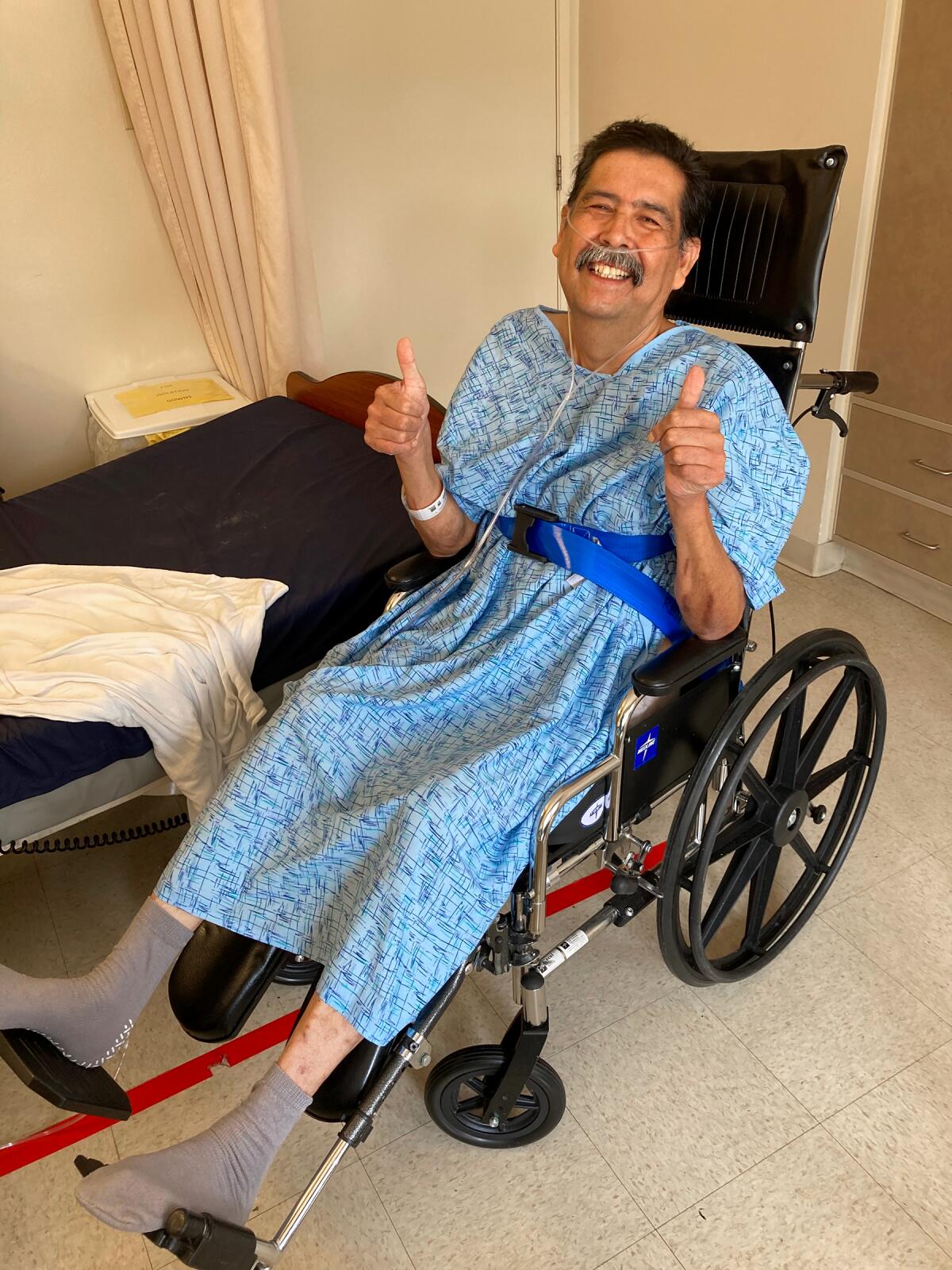
The Gonzalezes show that despite all this tragedy, we not only can survive but can plunge ahead into a murky future with confidence and hope.
And never alone.
Even as she and her mom closed the outdoor scissor gates to the store for perhaps the final time, Mabel looked for the good in life.
“Oh look,” she said as she pointed at the glass door. “Someone tagged something for my dad.”
In pink paint marker were the words “Get well Pancho.”
Outside the mercadito, customers — all masked — passed by and offered condolences.
“He’s a nice man,” said Antonio Monroy, who rents an apartment above Pancho’s. “It’s sad for us. What are we going to do without him?”
Porfirio Arriola, 69, lives down the street and strolled by just after the Gonzalezes left. He asked me when Pancho’s would open again, and he needed a moment after I told him the news.
“It’s hard,” Arriola finally said, angling his body under the shade of a utility pole. “Work all your life for something, and lose it all in a moment.”
The condolences have continued. Friends have raised more than $12,000 on GoFundMe to help with expenses. Customers have flooded Mabel’s inbox with photos of themselves inside the store. One guy even tattooed a detailed image of the corner where Pancho’s Mini Market stands onto his shoulder.
And Pancho is slowly but surely improving. He recently gained 11 pounds in a week and was able to stand by himself for three seconds. A photo Mabel sent me of her papi shows Pancho far skinnier than he was but with the same impressive mustache and a smile brighter than a diamond.
The coronavirus has destroyed the dreams of this typical Latino family in California. But it’s not going to stop them.
Because nothing can.
More to Read
Sign up for Essential California
The most important California stories and recommendations in your inbox every morning.
You may occasionally receive promotional content from the Los Angeles Times.

